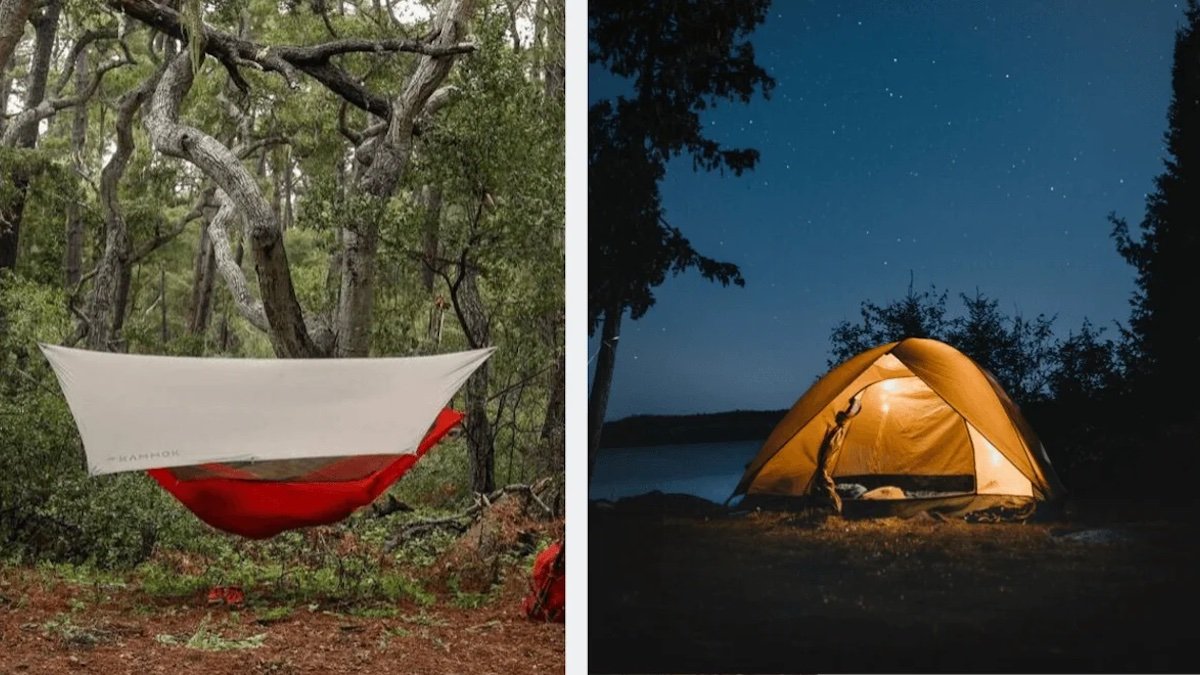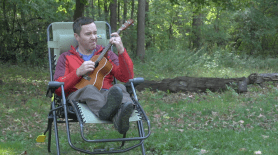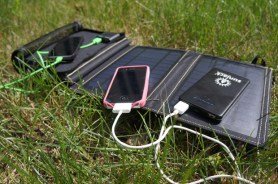

If you’ve been keeping your eyes open at campsites for the past few years, you’ve probably noticed a growing trend. And no, it’s not the fact that Crocs remain surprisingly popular among campers. We’re talking about the ever-increasing popularity of hammocks.
Yes, the hot new way to camp is three feet off the ground.
We all know a hammock is a wonderful, relaxing way to rock away your woes on a weekend, reading a book and sipping an iced tea. But is it any way to spend a night in the wilderness? In the debate of hammock vs tent camping, there’s a lot to be said for both sides. Let’s take a closer look!
Dealing With the Elements
Many people’s first reaction to the idea of sleeping in a hammock is “what about the rain?” You might also ask, what about mosquitos, or cold weather, or wind? Tents provide excellent protection against all of the above – except mosquitos, which can only be warded off by six cans of bug spray, a dozen tiki torches, a Voodoo sacrifice of three chickens, and a partridge in a pear tree.
Well, hammocks can handle all of those problems, too. For most models, you can order overquilts and underquilts to provide warmth and protection from wind. You can buy tarps to go over the top and keep the rain off. You can even buy mosquito nets. Word is, they’re pretty effective even without the chicken sacrifice.
The point being, both hammocks and tents are well-suited to protecting you from the elements, provided they’re properly set up.
Advantage: draw.
Size and Weight
An ultralight tent weighs a little over two pounds. A heavier-duty tent can easily weigh six pounds, eight pounds, or more. Contrast that to a hammock. Even a heavy-duty hammock will weigh two pounds at most, making hammocks the clear winner in this category.
But that’s assuming you’re only carrying the hammock. In reality, you’re going to want a mosquito net, a rain tarp, quilts, or some combination of the above. You’ll still come out ahead since you won’t need to carry any tent poles. But the weight advantage of hammocks, while real, is less than many people think.
Advantage: hammock.
Price
For about $200, you can get a reasonably dry summer tent. For $400 or $500, you can get a well-built all-season tent. For $800 or $900, you can get a tent that’s as luxurious as some hotels. Sounds like a pretty good deal, right?
Hammocks come in a lot cheaper. For $50 or $60, you can get a nice rig for camping on dry summer nights. For $200, you’ll be set up for rain and mildly cold weather. For around $500, you can have some of the best hammock sets around.
Advantage: hammock.
Choosing a Campsite
One of the principles of Leave No Trace camping is not to bed down anywhere that’s not already bare ground. Sometimes, that’s hard to do with a tent, particularly a large tent with vestibules. By comparison, all you need to camp with a hammock is a pair of trees.
On the other hand, there are plenty of campgrounds without any trees. If you’re in scrub, desert, or other open ground, a tent is still a viable option, while your hammock will just leave you hanging.
Advantage: draw.
Storing Your Gear
When you’re camping in foul weather, it’s good to be able to keep your pack dry. It’s also nice for it to be accessible. What’s the point of having a warm, dry tent if you have to get out every time you want to grab something from your backpack?
For these rainy-day type situations, many tents have large vestibules with plenty of space for your backpack, your boots, and your rain poncho. With a hammock, your best option is to leave your bag on the ground underneath you, which provides minimal protection at best.
Advantage: tent.
Comfort
You don’t always get to choose the most comfortable ground for sleeping. This is particularly true on wooded areas, where there’s hardly a square foot of ground in sight without a root or rock sticking out like part of the world’s most sadistic chiropractor’s table.
In a tent, you either have to make the best of a bad situation or carry a heavy air mattress. In a hammock, who cares about roots? You’re sleeping on air.
Advantage: hammock.
The Final Verdict
In all, we’ve looked at six areas of performance: protection from the elements, size and weight, price, choosing a campsite, storage space, and comfort. Out of these, hammocks were the best in three areas, while tents were the best in one area, and the other two were a draw.
It looks like hammocks are the winner. That said, as you can see, tents still have distinct advantages that make them a better option in many situations. If you’re looking for an all-in-one camping hammock, check out the new Kammok Mantis. It comes with everything you need for $229.
Article updated Dec. 7, 2023









